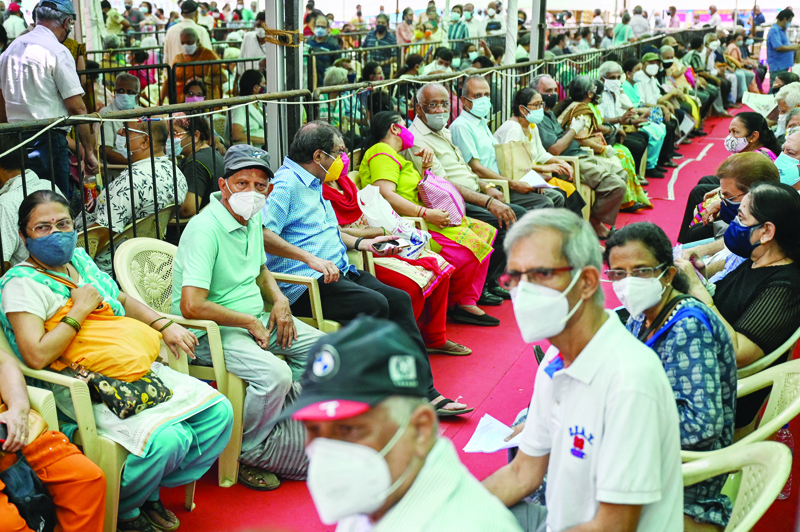NEW DELHI: The first emergency medical supplies trickled into COVID-stricken India yesterday as part of a global campaign to staunch a catastrophic wave in the latest pandemic hotspot, with the United States also pledging to export millions of AstraZeneca vaccine doses.
India's infection and death rates are growing exponentially, overwhelming hospitals, in contrast to some wealthier Western nations that are starting to ease restrictions. The virus has now killed more than 3.1 million people worldwide, with India driving the latest surge in global case numbers, recording over 350,000 new infections yesterday.
Crates of ventilators and oxygen concentrators from Britain were unloaded at a Delhi airport early yesterday, the first emergency medical supplies to arrive in the country. Elsewhere in the capital AFP images showed smoke billowing from dozens of pyres lit inside a parking lot that has been turned into a makeshift crematorium. "People are just dying, dying and dying," said Jitender Singh Shanty, who is coordinating the cremation of around 100 bodies a day at the site in the east of the city. "If we get more bodies then we will cremate on the road. There is no more space here."
'We will be there for them'
The United States, France, Germany, Canada and the World Health Organization have all promised to rush supplies to India. President Joe Biden announced on Monday the United States would send up to 60 million doses of the AstraZeneca COVID-19 vaccine abroad.
White House spokeswoman Jen Psaki said the recipient countries had not yet been decided and that the administration was still formulating its distribution plan. But India appeared to be a leading contender after Biden spoke with Prime Minister Narendra Modi-whose Hindu-nationalist government is under fire for allowing mass gatherings such as religious festivals and political rallies in recent weeks. "India was there for us, and we will be there for them," Biden tweeted after the call with Modi, referencing India's support for the United States when it was enduring the worst of its COVID crisis.
'Beyond heart-breaking'
World Health Organization chief Tedros Adhanom Ghebreyesus on Monday described the situation in India as "beyond heartbreaking". "WHO is doing everything we can, providing critical equipment and supplies," Tedros said. France also said it would send eight oxygen production units, as well as oxygen containers and respirators, to India. However many nations have also sought to close borders to travellers from India, fearful of a variant that appears to be one of the drivers of the surge.
Belgium yesterday became the latest territory to ban travellers from India, Brazil and South Africa, major countries hit by fast-spreading coronavirus variants. "Passenger travel by air, train, boat, and bus, including transit traffic, from India, Brazil and South Africa to Belgium will be banned," Prime Minister Alexander de Croo announced in a statement.
Australia also cut all passenger air travel with India, suspending flights until at least May 15. Among the Aussies still in the country are a host of high-profile cricketers playing in the lucrative Indian Premier League, which has attracted criticism for continuing during the crisis. Before the ban was announced, News Corp reported that batsman Chris Lynn of the Mumbai Indians had requested the Australia cricket board put on a chartered flight home for the players once the IPL finishes. "I know there are people worse off than us... We are not asking for short cuts and we signed up knowing the risks," Lynn said. "But it would be great to get home as soon as the event is over."
Italian cafes reopen
Brazil's stuttering inoculation program took another hit Monday after regulators denied requests from several states to import Russia's Sputnik V vaccine over a lack of data on its safety and efficacy. With more than 390,000 COVID-19 deaths, Brazil's death toll is the second-highest number globally, with the government having fully vaccinated around 6 percent of the population.
In Europe, nations that have endured months of restrictions are taking steps towards normalcy as the benefits of vaccination campaigns start to kick in. In Italy-the first European country to be hit by the pandemic in early 2020 and still one of the worst affected-bars, restaurants, cinemas and concert halls reopened on Monday.
After months of stop-start restrictions imposed to manage second and third waves of COVID-19, Italy hopes this latest easing will mark the start of something like a normal summer. "I've cleared my schedule," enthused 71-year-old Ottavio Rosati, a movie director in Rome. "I'm booked up with museums, restaurants and bars... I'm not going to sit still!" - AFP



